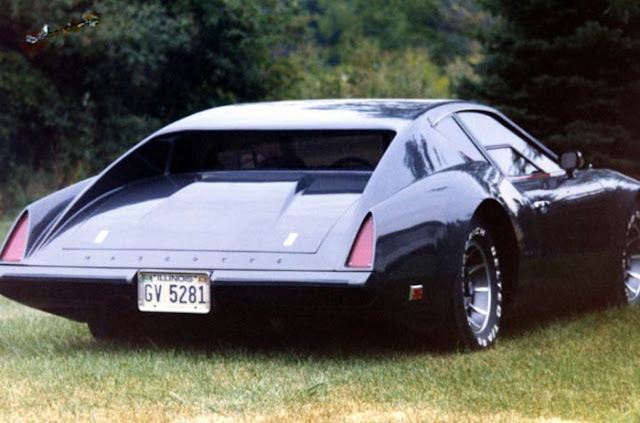A Caribbean Queen
One of the most revered and storied makers of kit and specialty cars in America, Fiberfab, was founded by Warren "Bud" Goodwin in 1964. Goodwin was born in 1921 in Milwaukee, Wisconsin but moved to California in 1957. He was a former race car driver and entrepreneur who had already been a pioneer in the US kit car scene. His previous company, Sports Car Engineering, produced Microplas Mistral bodies under license under the name "Spyder".
One of Fiberfab's most iconic products was the Jamaican series of kit cars. It boasted styling that would have rivaled anything from the Italian design houses of its era. Classic proportions, with a long dash-to-axle ratio, swept back windshield, and gently curving roof and hood lines. The car had been named for Bud Goodwin's ill-fated second wife, Jamaica. As a design, it was a stunning statement and garnered a good deal of attention from the enthusiast's press.
The car was designed by the Beebe brothers, Russell and Chris, in 1967 after Russell had designed the Banshee earlier. They were outraged that the design of the Banshee had been changed by the mold maker before being offered for sale, so they designed the Jamaican. The first one was completed in 1968. It is rumored that the designer erroneously credited with styling the Datsun 240Z, Albrecht Goertz, visited Fiberfab with a team to take photos and measurements of the scaled sections of the Jamaican's body buck. While this is pure hearsay, he does admit that some of his inspiration came from the Jamaican, in one of his books.
The Jamaican was first engineered for an Austin Healey donor and that version denoted by a hump or rise to the left side of the bonnet/hood, while the Triumph Spitfire powered variant had two small air intakes on the hood (one on each side). There were also versions made for MG-A donors. The car was later offered in a VW-based version to fit on a bug floor-pan, due to the strong growth in that segment of the kit car market. The VW version had a three-piece body.
On Sept. 13, 1967, Goodwin was arrested on suspicion of murder in the shooting death of his second wife, Jamaica. The police reported that Bud had found Jamaica with Thor Kiddoo, a house guest and purported Fiberfab factory engineer. Bud's involvement in the company was largely over at that point, he pled no contest, and was convicted of voluntary manslaughter. The Beebe brothers left Fiberfab shortly after completing their design work about this time. Things had gone decidedly south at the company, and it was time to move on. Bud died of a heart attack a year later, while incarcerated.
In the aftermath of these unfortunate events, Fiberfab soldiered on and continued to produce new kits for the growing market. Among them, the Jamaican II was produced and advertised in 1969. With the new versions, the body got wider, sporting flared fender arches, the hood received a 'power bulge' (not unlike contemporary Corvettes of the era), the clamshell hood disappeared, the rearend got a ducktail spoiler, a real trunk was added, and the front fenders received non-functional vents below the beltline of the body sides.
The biggest change, however, may have been the addition of a V-8 powered Jamaican II on a custom tubular frame. Given the anemic performance of the previous model's donor cars, this was likely an effort to give the car performance to match its appearance. There are believed to be 10 produced at the time, with 8 remaining known to the owner community on Facebook.
While the Jamaican's production run in the USA ended in the mid-1980's, Fiberfab's Canadian division sold the VW version of the car into the 90's. In 1981, they completed a new redesign of the Jamaican and presented it with a German V6 engine in Turin, Italy. This version was called Jamaican SKR, however it was never produced in any numbers.
Total production of the Jamaican is believed to be 250 units and the molds are lost to time. Examples of the car can be found all over the world from USA to Mexico, Columbia, UK, Denmark, NZ, Germany, and Italy. It is a unique and timeless design with a large fan following on the internet.
The Beebe brothers are both retired now and live in the USA. Chris restores classic cars for kicks, in his Madison, Wisconsin area shop. Russell is spending his time doing a variety of artistic pursuits. Both are still involved in the community of Fiberfab enthusiasts.
Sources:
Chris Beebe
Special thanks to Chris Beebe for his input on this article.
 |
| The original Fiberfab Jamaican I with co-designer Chris Beebe |
 |
| A Fiberfab Jamaican I, owned by co-designer Chris Beebe |
 |
| A Fiberfab Jamaican I, owned by co-designer Chris Beebe |
 |
| A Fiberfab Jamaican I, owned by co-designer Chris Beebe |
 |
| Fiberfab's Jamaican II |
 |
| Fiberfab's Jamaican I owned by Bill Spohn (possibly) |
 |
| A beautiful, period correct Jamaican I |
 |
| A particularly nice build of Fiberfab's Jamaican II |
 |
| Matt Moore's Jamaican I |
 |
| Fiberfab's Jamaican II demo car |
 |
| Fiberfab's Jamaican II demo car interior |
 |
| Fiberfab's Jamaican II demo car in profile |









Comments
Post a Comment